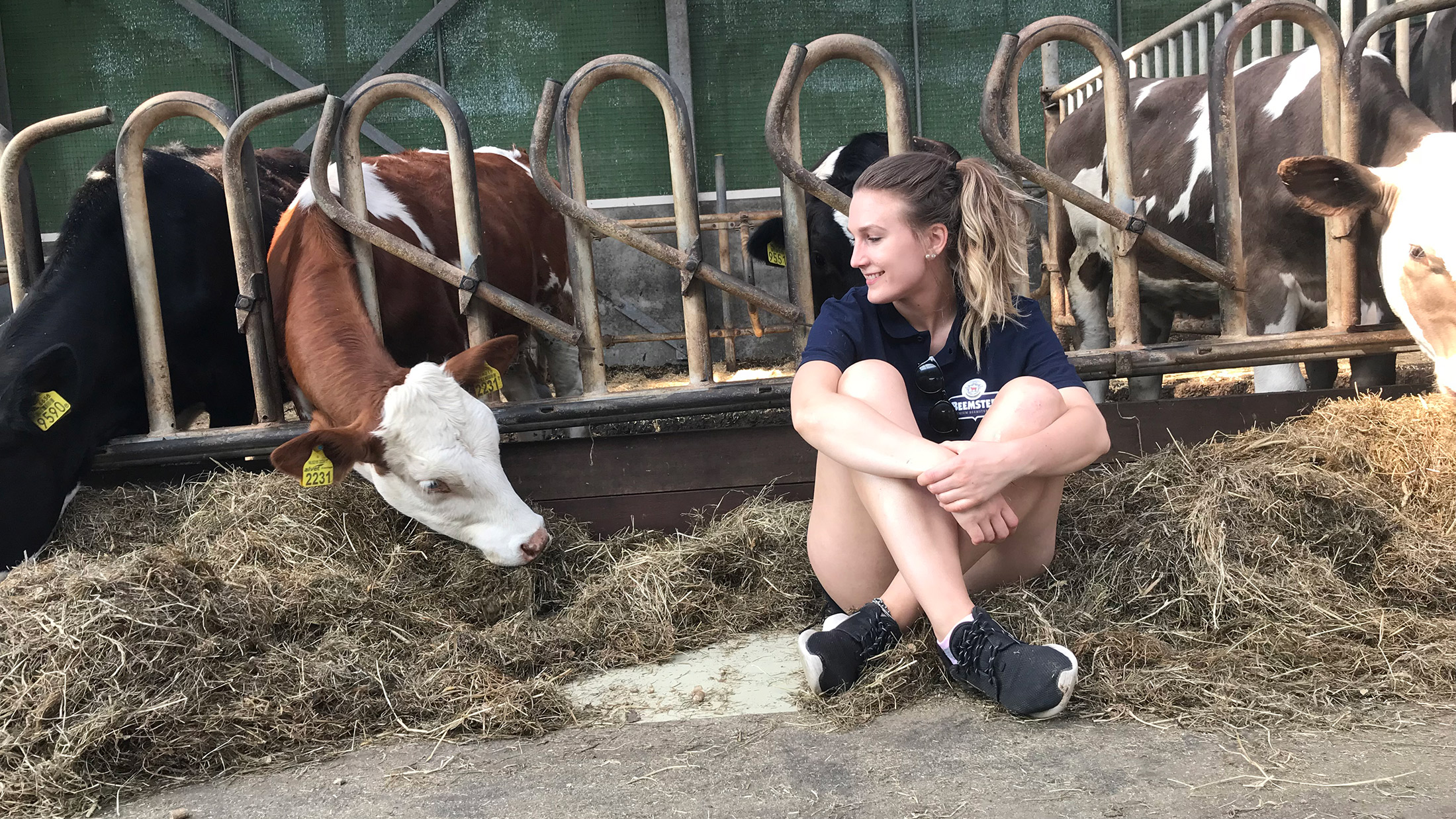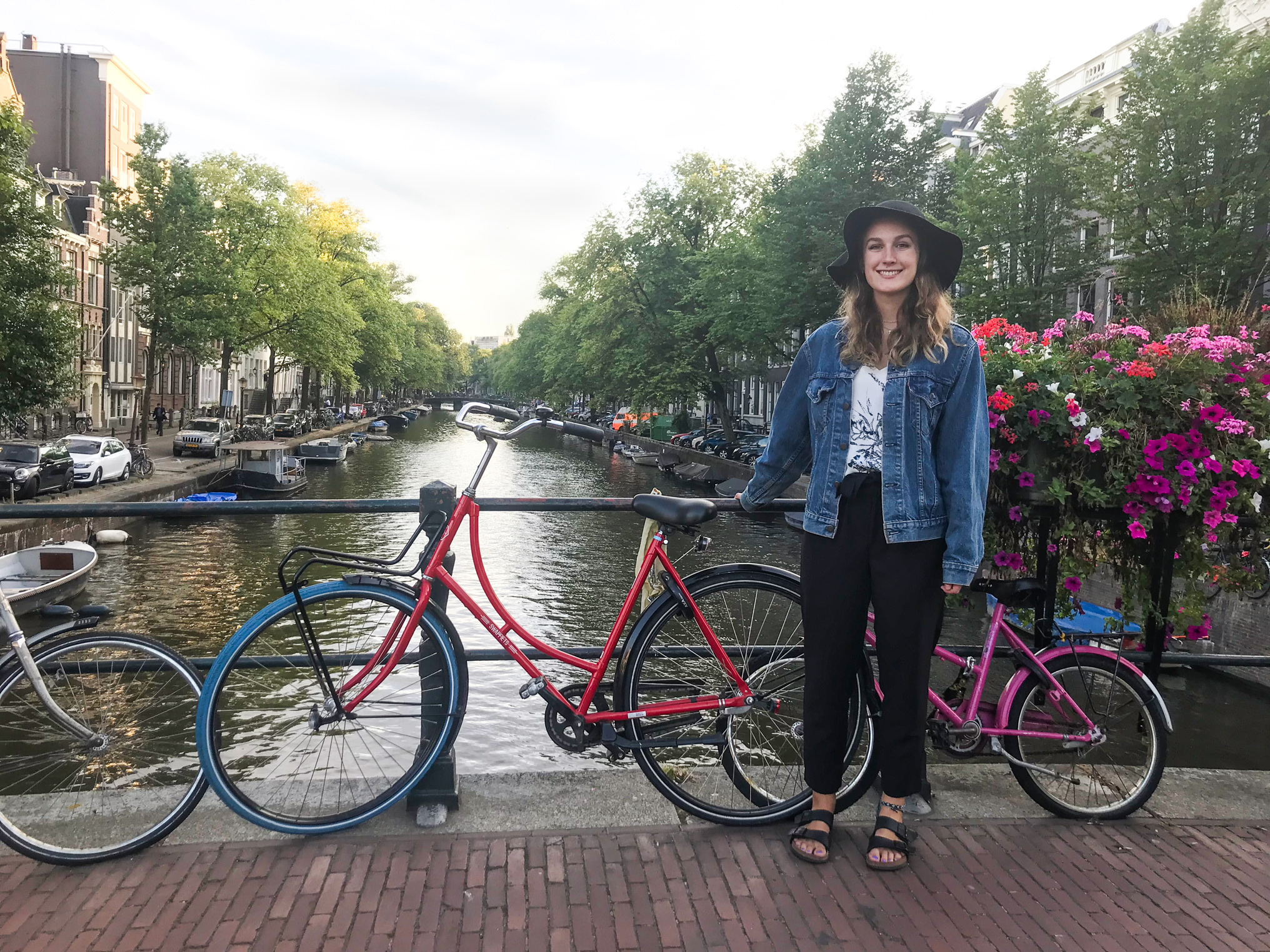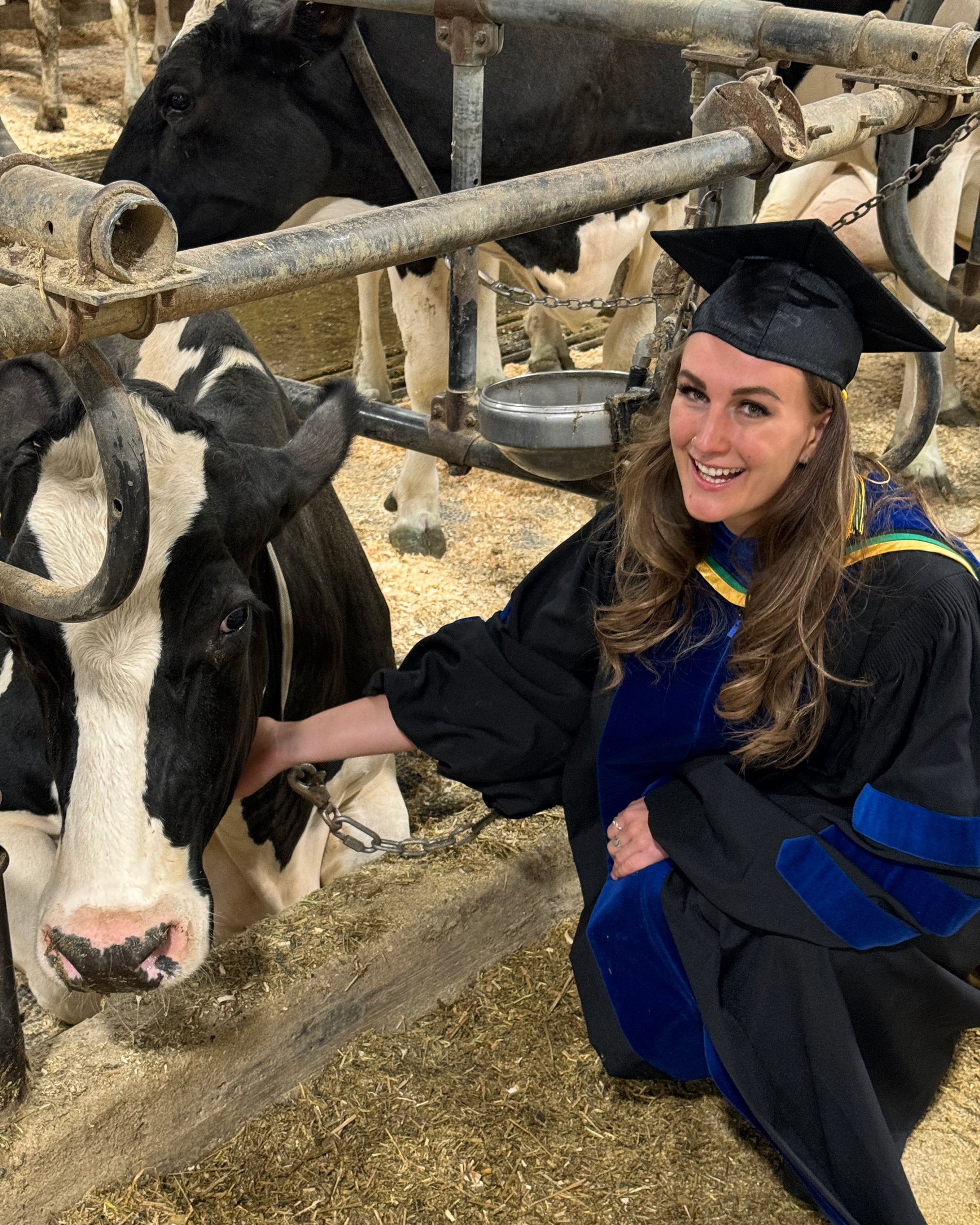The ALES Centennial Dutch Endowment Travel and Experiential Learning Award offers students a window to the world
Donna McKinnon - 20 February 2024

As an undergraduate student in the animal science program, Lauren Engelking was awarded the ALES Centennial Dutch Endowment Travel and Experiential Learning Award, which helps ALES students study, research and work with universities and organizations in the Netherlands to learn the leading-edge agricultural practices that have made that country the world's second leading agricultural exporter.
It was a life-changer for this born-and-raised Calgarian.
Stationed in the Netherlands, Lauren used her time to build her knowledge and skills, hone her interests and explore other European countries as well as nearby Dutch farming communities.
Her passion for ‘connecting the dots', Lauren’s research is focused on the investigation of the chain of events and the affected metabolic processes of animals, particularly cows, which she calls, the “ultimate recyclers”. It’s a field she’s explored both as a doctoral student at the U of A, and in her study abroad and internship in the Netherlands.
Now working as a postdoctoral researcher at the University of Guelph and Trouw Nutrition in the Netherlands, where she interned as an undergraduate, Lauren is keen to put her knowledge to work.
“Travelling to another country to learn and improve my knowledge in animal science, as well as experience other cultures and push myself to do things outside my comfort zone, has been one of the most rewarding and valuable experiences of my life.”
What piqued your interest in animal science and nutrition?
I’ve always wanted a career that involved animals in one way or another. I started my undergrad in biology, not really knowing what I was going to do, but knowing I wanted to do something related to science. When I discovered there was in fact a whole program dedicated to animal science in the Faculty of Agricultural, Life & Environmental Sciences, I applied and made the switch to animal health, beginning in my second year.
At first I thought I would be a vet, as I’m sure many undergraduates do. I wasn’t even aware there were other careers that allowed you to work with animals... While in my second year of school, I decided to sign up to help with the Poultry Research Centre as I was eager to gain more hands-on animal experience and broaden my horizons beyond cats and dogs. This involved early mornings of observing chickens in a trial evaluating chicken welfare related to different housing designs. Frank Robinson was also very influential in my love for animal agriculture throughout my undergrad!
In my third year of school, I was ready to get involved in research again and reached out to one of my professors, Burim Ametaj, and asked if I could help with his ongoing dairy cow trials. He connected me with one of his graduate students who put me to work helping with animal sampling, and recording gait and respiration scores. Through this experience, the school vet recommended me to Michael Steele’s lab [now with the University of Guelph] where I continued helping out with dairy cattle research, this time with calves.
By the end of my third year, Dr. Steele hired me as a research assistant and I continued to help with animal sampling and husbandry throughout the summer. During this time I also started collecting data for my own independent study that assessed the interaction between calf nutrition and behaviour. An independent study is something undergraduates can do as an approved program elective. It involves a literature review, designing and conducting your own research and writing a paper / report of your findings in a similar format to a scientific publication. The data I collected that summer I was then able to use for my independent study course. The research went so well, Dr. Steele invited me to attend the American Dairy Science Association (ADSA) Annual Meeting in Knoxville, Tennessee.
Through my undergraduate research experience, and my experience at ADSA, I was truly inspired by the research process and eager to continue working in research, with a focus on dairy cattle nutrition and physiology, which led me to pursue graduate studies.
How did you find out about the study abroad program, and specifically the ALES Centennial Dutch Endowment Travel and Experiential Learning Award?
During my fourth year of school, a guest lecturer, René Kwakkel from Wageningen University in the Netherlands, spoke about the opportunity to complete an exchange to the Netherlands. He mentioned that there was an ongoing partnership between U of A and Wageningen that facilitated student exchange between the two schools. From the U of A side, there was an endowment fund, the ALES Centennial Dutch Endowment Travel and Experiential Learning Award, that would support students to complete this exchange. I spoke to Dr. Kwakkel after the class and indicated my interest in the exchange, and he put me in contact with the undergraduate student support staff from ALES. These staff were instrumental in completing all the necessary paperwork and they informed me of the additional funding available from the Experiential Learning Award.
Do you speak Dutch and was it necessary to apply for this study abroad program?
I don’t speak Dutch and it definitely wasn’t necessary to apply or at any point of the program! Everyone in the Netherlands speaks excellent English so it wasn’t hard to get by. I did pick up a handful of Dutch words when I was over there, though!

You were there from May 2018 - Aug. 2018. What was that experience like for you personally and also, professionally?
Overall, I had a fantastic experience in the Netherlands. I flew to the Netherlands in the first week of May, with another student, Juanita, whom I completed my studies and internship with. We intentionally arrived in the Netherlands a little more than a week prior to the beginning of classes, for a few reasons. Firstly, we wanted to be present in the Netherlands for their liberation day, a day they celebrate their liberation from the war. Celebrations included music, a parade, a ton of food, live music and even a ferris wheel. After liberation day, we still had about a week before classes started, so we took a quick trip over to Italy to see the sights. Everything in Europe is relatively close, and flights can be fairly reasonably priced, so we took advantage of this and went to Italy for about a week, visiting Rome, Florence and Venice. When we got back, we ensured we were settled into our new home, which was a shared dorm with other international students. For any students considering an exchange, I highly recommend staying at one of the many international residences as it’s a fantastic way to meet other students in similar situations. I’m still in contact with many of my old housemates.
After we settled in, we began classes at the university. The first two months of my exchange, I took feed formulation science, scientific presenting skills and scientific writing skills. Feed formulation science was really interesting, and a unique course that is not offered at the U of A. In addition to improving my understanding of diet formulation, I also gained insight into nutritional management of livestock in Europe. Our course even included a field trip to a factory that converted human food byproducts (candy, chocolate, mayonnaise, ketchup, bread, cheese, everything you can think of) into food for animals.
In my scientific writing skills class, I improved my ability to communicate my research findings in scientific publications. My scientific presenting class was similar; I was provided many opportunities to practice effective communication of scientific concepts to an array of audience types. We had weekly practice sessions in which we received feedback from instructors as well as other students. To this day I feel that course allowed some of the greatest improvements in my communication skills.
In addition to these courses, I was also volunteering with some of the ongoing research trials at the university, which was fantastic as they have incredible research facilities and it was amazing to be able to experience them first hand. During this time I also began a bachelor’s thesis for additional credits at Wageningen. As I was working with Trouw Nutrition at the same time, I was in a unique position where the research completed at my internship could be used to prepare my bachelor’s thesis at Wageningen. During my courses, I began preparation for the internship I would complete at Trouw in addition to performing a literature review to prepare for the upcoming research and to include in my bachelor’s thesis.
In preparation for my internship, I was able to meet with some of the scientists at Trouw in the evenings or weekends; everything in the Netherlands is so close, especially with their advanced train system, so it was easy to get from one place to another in a timely manner. When we completed our courses, Juanita and I moved to Boxmeer in the Netherlands, where Trouw has their Research and Development facilities. We were able to live right on the farm in the student researcher housing and we stayed there for the majority of July and August. While we were working at Trouw, our daily duties included animal care and feeding, animal sampling and sample preparation. We also had regular meetings with our supervisors at Trouw, and we were able to visit the Trouw Nutrition headquarters in Amersfoort in addition to working at the offices in Boxmeer. The trial we were involved in was assessing different electrolyte formulations for neonatal calves. When the animal work was complete, I worked alongside my supervisor to assess calf acid-base balance and how electrolyte intake and formulation affected this. With this data, I prepared my bachelor’s thesis for Wageningen. At the very end of August, we both presented our research findings to numerous faculty at Wageningen who evaluated us and provided a grade for our theses.
Wageningen is one of the best, if not the best agriculture university in the world, so it was incredible to be around so many faculty and students that shared my passion for agriculture. There were a handful of times I felt homesick of course, but overall I grew immensely during this experience and it has made me so much more independent and confident.
It obviously made an impact, because you now have dual postdocs at the University of Guelph and Trouw Nutrition. Do you go back and forth between Canada and the Netherlands?
I’m completing a postdoc where I am co-supervised by the University of Guelph (Dr. Mike
Steele) and Trouw Nutrition. I’m currently in Guelph helping out with Dr. Steele’s group and teaching a first year undergraduate course (Animal Production Systems and Industry). I started my position at the beginning of December, working remotely from Alberta. In January, I completed the very long, five-day drive, from Calgary to Guelph.
I’ll be in Guelph until the end of April, and then I’ll move to the Netherlands to complete a two-year contract with Trouw. I’ll still be a postdoc through Guelph, but I’ll primarily be working with Trouw and learning from the Research and Development team there.
What, specifically, is your area of research and why are you passionate about it?
My research overall area is dairy cattle nutrition and physiology, with a bit of behaviour and immunology mixed in. During my PhD under the supervision of Masahito Oba, I mostly focused on how we can alter dairy cow nutrition to improve physiological responses and modulate the immune system around calving. Now in my postdoc, I am still involved in nutrition, but I’m switching gears to evaluate nutritional factors involved in calf health.
I’m fascinated by how all bodily process are interconnected and how even the smallest disruption in homeostasis can result in a cascade of events that totally change metabolism and physiology. I love “connecting the dots” in research and investigating the chain of events and the affected metabolic processes. Cows, in particular, are amazing to study as they have such unique and fascinating physiology. For example, ruminants, such as cows, have four-chambered stomachs with vast microbial populations that allow the breakdown of complex feeds that humans and other animals cannot digest, allowing cows to be the ultimate “recyclers” of organic matter that would otherwise go unused. What’s even more interesting is that the microbes inside cows can literally synthesize high-quality protein from non-protein sources, such as grass. The ability of cows to upcycle “garbage” into protein is pretty cool.
 What’s next for you, career-wise?
What’s next for you, career-wise?
That’s a great question! I’m not exactly sure yet. I’m going to see how the next couple years go working in an industry setting with Trouw. I know I love research, and would like to be involved in it in some capacity for the rest of my career, but I’m not sure yet if I want to work in an academic, government or industry setting. As well, I really have a passion for teaching, so I know whatever I do I want to ensure I can incorporate teaching or some other type of knowledge-transfer into my day-to-day activities. I’m thinking I will probably come back to Canada after my two years in the Netherlands, but I’m also open to staying in Europe should a good opportunity arise.
What is the value of donor-funded study abroad opportunities, and would you recommend this program (and others like it) to undergraduate students?
These opportunities are truly invaluable. I don’t think I would be where I am today if I hadn’t gone on that exchange nearly six years ago. Being able to travel to another country to learn and improve my knowledge in animal science, as well as experience other cultures and push myself to do things outside my comfort zone, has been one of the most rewarding and valuable experiences of my life. The year after I went to the Netherlands, I started my masters program at the U of A, and I know I was so much better prepared to start my graduate research from being involved in undergraduate research opportunities. I also went to Japan to conduct research in my first year of grad school, this time on my own without a friend, and I felt so much more prepared to travel to another country as I had done it once before. This past fall, after I had completed my PhD, I also travelled around South East Asia on a grad trip, and again, I felt so much more confident and prepared for this trip because of my previous study travels.
In addition to the incredible experience I gained during my Netherlands exchange, working with Trouw in 2018 as an undergraduate intern allowed me to obtain my current postdoc position with them as they were already familiar with me and my abilities. I highly, highly recommend this type of opportunity to any undergraduate. Not only will you improve your academic knowledge and international perspective, you will grow immensely as an individual and you will have a greater appreciation for other cultures and their way of life.
Is there anything else you’d like to share?
I will just emphasize again how incredible of an opportunity it is to complete a global exchange. I think the growth you experience from travelling to another country is hard to match. Of course you will gain the additional academic knowledge and skills, but the life experience you obtain when you go and immerse yourself in another country is truly one of the best takeaways.
Students at the U of A are very lucky to have access to funding through the ALES Centennial Dutch Endowment Travel and Experiential Learning Award. Thanks to his award, I hardly paid anything out of pocket, aside from my own personal travels around Europe.
If you’re like I was, and you’re not totally sure because it’s far away and it’s a big step, just dive in and do it. It was honestly one of the best experiences of my life and I wouldn’t be where I am in my career without the experience.
If you are interested in applying for the ALES Centennial Dutch Endowment Travel and Experiential Learning Award, please visit the website here.